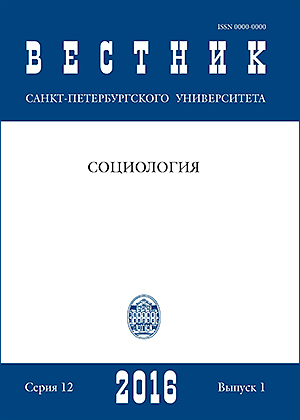SUBJECTIVE AND OBJECTIVE DETERMINANTS OF HEALTH
DOI:
https://doi.org/10.21638/11701/spbu12.2016.102Abstract
This article examines the theoretical and methodological basis of the interrelated and complex notion of the person as a whole and also examines the practice of preserving his health. Man as an whole is characterized by fundamentally different layers of phenomena — from the material to various manifestations of mental and social qualities. All parameters of this wholeness and the characteristics of their interactions can be either in a state of normality (health) or its violation it (the state of disease). Definitions and characteristics of health depend on human interaction with social environments, and are considered in a continuum: from an arbitrarily low level (objective) to provisionally higher one (subjective). The subjective position of man includes awareness of health as a basic value of life, an awareness which Russians have historically underdeveloped. The capacity for self-transformation is the most important characteristic of wholeness, which can affect both prevention and the course of disease itself. The process of matching the composite elements of wholeness with objective requirements often extends over the entire period of a person’s life and is reflected in the success of adequate social inclusion. The success of such inclusion contributes to a balance in the activities of medical and representatives of the human sciences, as well as to the productiveness of the population’s orientation towards a healthy lifestyle and various risks and threats to its preservation. Refs 16.
Keywords:
human, health, disease, wholeness, the principle of combining, social environment
Downloads
References
References
Downloads
Published
How to Cite
Issue
Section
License
Articles of "Vestnik of Saint Petersburg University. Sociology" are open access distributed under the terms of the License Agreement with Saint Petersburg State University, which permits to the authors unrestricted distribution and self-archiving free of charge.




